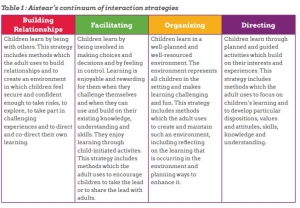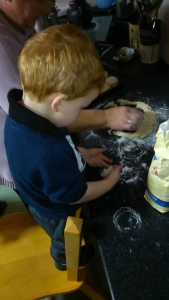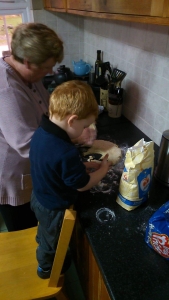Nurturing and Extending Interactions is one of the pillars in the Aistear Síolta Practice Guide.
“Aistear’s principle on relationships states, Children have a fundamental need to be with other people. They learn and develop through loving and nurturing relationships with adults and other children, and the quality of these interactions impacts on their learning and development (Principles and themes, 2009, p.9). Similarly, Síolta’s principle on relationships acknowledges that, Responsive, sensitive and reciprocal relationships, which are consistent over time, are essential to the well-being, learning and development of the young child (Síolta Principle, 2006, p.7). Standard 5 of Síolta, Interactions, highlights that fostering constructive interactions requires explicit policies, procedures and practice that emphasise the value of process and are based on mutual respect, equal partnership and sensitivity. The components focus on the types of interactions that take place, supporting positive interactions, using all aspects of the daily routine to interact positively and also the importance of adults both in terms of their interactive style and their interactions with each other.”
Involving children, even the very young in normal day to day routines such as baking and cooking, provides opportunity for developing and extending interactions.
Bringing kids into the kitchen can benefit them in a number of ways. Baking/Cooking can help:
- Build basic skills. You can help your child hone basic math skills by doing something as simple as counting eggs or pouring water into a measuring cup. You can ask what comes first, second, and third or count together as you spoon dough onto a cookie sheet. When you read a recipe together, you’re introducing new words to your child’s vocabulary and promoting literacy. Following steps in the recipe can work on listening skills.
- Encourage an adventurous palate. Preschoolers are notoriously picky eaters, and bringing them into the kitchen to cook can help get them to open up to new tastes. When your 3-year-old daughter plays chef she might sample dishes she wouldn’t try if you just served them to her. So encourage kids to taste new ingredients you’re working with and talk about what they like and how healthy foods make a body grow.
- Help young kids explore with their senses. Kids learn by exploring with their senses and the kitchen is an ideal place to do that. Invite them to listen to the whir of the mixer, pound dough and watch it rise, smell it baking in the oven, and finally taste the warm bread fresh from the oven. If it smells good, looks appealing, and is easy to eat they may just be willing to try it!
- Boost confidence. Preschoolers love to show what they can do and working in the kitchen provides opportunities to gain a sense of accomplishment. If they helped assemble the pizza, let them know that their help was important. You could name the pizza or another dish after your child. Serve “Will’s Pizza” or “Ella’s Salad” for dinner tonight. Even if the end results are not exactly what you expected, praise their efforts. www.kidshealth.org/parent/growth/learning/cooking_preschool
- Baking
- Baking



